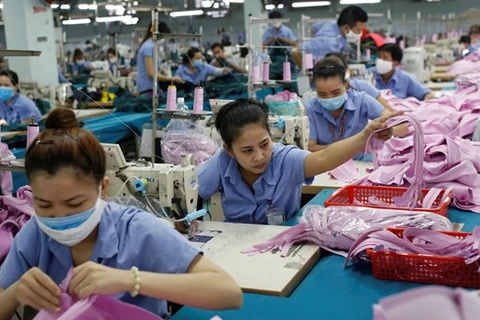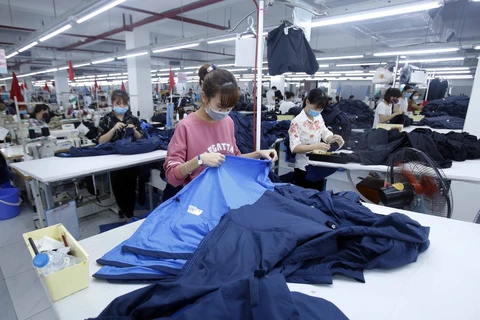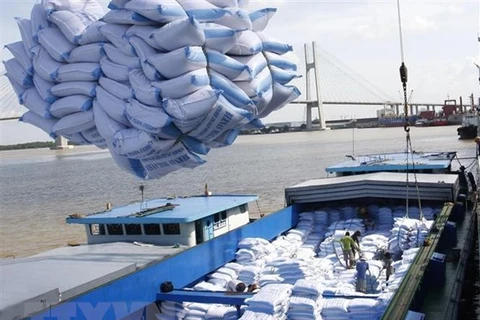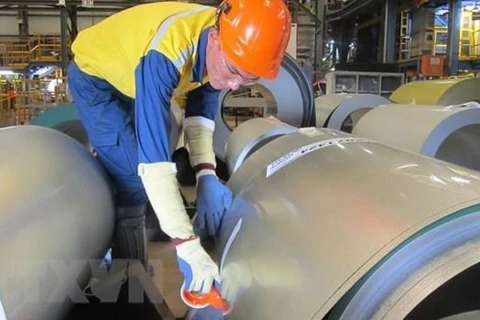Hanoi (VNA) – Market operation is a decisive factor for Vietnam if the country is to make full use of the advantages brought about by the EU-Vietnam Free Trade Agreement (EVFTA) and lure foreign investment effectively, experts say.
In the verification report for the approval of the EVFTA, Chairman of the National Assembly Committee for Foreign Relations Nguyen Van Giau underlined that the deal is a chance for Vietnam to attract more investors from the EU in the high technology processing-manufacturing industry, green and renewable energy, and services.
However, he held that the market operation procedure is key for the country to optimise EVFTA commitments to attract FDI.
Clear understanding for a better response
Agreeing with the report, Chairman of the Vietnam Chamber of Commerce and Industry (VCCI) Vu Tien Loc asserted that the approval of the EVFTA will contribute to strengthening exports and smoothing the flow of high-quality investments from the EU, bringing Vietnam deeper into the global supply chain.
At the same time, the EVFTA also provides Vietnam with more motivation to reform the institution and enhance the competitiveness of the economy and business community, promoting growth and creating more jobs for people.
However, Loc pointed out that the economy and enterprises have to overcome numerous difficulties to make full use of the deal.
Loc held that the capacity of Vietnamese firms to engage in global value chains has been limited in the assembling and simple production stages, with great dependence on imported materials, especially from countries outside the EU. This is a barrier hindering them to optimise the benefits from the tax reduction, he said, stressing the need for improvement during the implementation of the EVFTA.
He went on to say that regulations related to non-tariff measures and livestock and plant quarantine stated in the EVFTA remain complicated, leading to higher costs for completing the rule in Vietnam than that in the majority of ASEAN countries. This also slows down the trade capacity of Vietnam as well as benefit from the EVFTA, he added.
To deal with the issue, Loc said that Vietnam should roll out effective measures to attract FDI when implementing the EVFTA, focusing on coping with existing barriers such as those in institutions and infrastructure as well as human resources quality.
In addition, spending on non-official cost also makes investors, especially those from the EU, hesitate to enter Vietnam, he held.
Loc also cited the VCCI research on the Vietnam Provincial Competitiveness Index 2019 on 1,583 FDI enterprises, which showed that the firms still faced a number of risks related to asset ownership rights and regulatory compliance costs. They revealed that the non-official cost accounted for about 1.04 percent of their revenue in 2018. Of 6.81 quadrillion VND in the total revenue of the FDI sector in 2018 showed in the White Book on Vietnam Businesses, the cost was estimated at 70.82 trillion VND. The research also pointed out that the scale of non-official cost in the FDI sector slightly rose to 1.11 percent in 2019.
According to Dau Anh Tuan, head of the VCCI Law Department, 48 percent of FDI firms had to pay about 24 million VND as a non-official fee for receiving a construction licence.
He said that the figure has yet to reflect the real cost that the business will have to pay, while many firms skipped the application for a construction licence to avoid the cost.
“An obvious risk is being seen that corruption may force operating businesses to get rid of the intention to expand their operation in Vietnam,” stated Tuan.
FDI investment must be qualified
Loc underscored that the EVFTA is like a highway to integration and when the National Assembly deputies press the button to pass the deal, the economy must operate smoothly for it to be effective.
Loc recommended a number of measures, including the issuance of legal documents to legalise commitments and guide the implementation of the commitments.
It is necessary to supplement to get legal documents with relevant contents underway, along with policies to make up the missing income from import tax due to tax reduction following commitments in the deal, he said.
Experts from the World Bank expected that the EVFTA will promote the FDI flow, but they held that Vietnam will counter basic challenges such as in the handling of increasing trade complaints.
Loc pointed to the need to simplify administrative procedures and improve the business environment towards ASEAN and international standards. He advised State management agencies to ensure the accurate implementation of obligation in investment protection to avoid complaints.
He stressed the need for the Government to design necessary policies to support domestic firms in enhancing competitiveness, while policy-makers should have the vision to cope with unexpected changes from the deal as well as the international economic integration process.
Loc underlined that the EVFTA is not a free “highway to integration,” but it needs proper investment. He advised businesses to actively explore opportunities and challenges from the deal, thus enhancing their competitiveness.
The Government should invest more in the completion of the institution, the improvement of the infrastructure system, and the enhancement of human resources quality, he stated.
“To maintain effective operation amidst the EVFTA and Comprehensive and Progressive Agreement for Trans-Pacific Partnership (CPTPP) as well as other deals, and to lure high-quality FDI flow, the above-mentioned work should be sped up,” added Loc./.
























